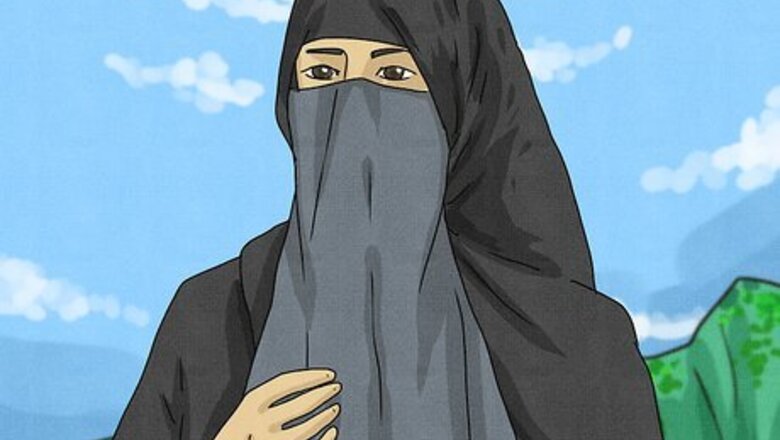
views
Understanding Wearing the Niqab
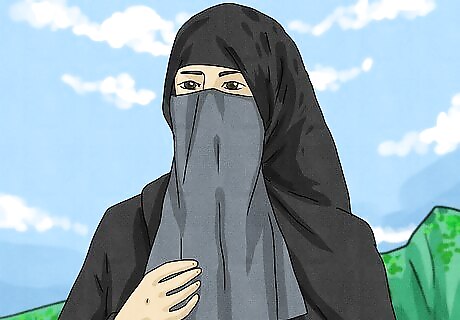
Know why you wear the niqab. The niqab is worn as an act of worship, something to protect you and help you become closer to Allah. Keep this in mind if you face any hardship because of your choice to wear the niqab in a non-Muslim country. Wearing the niqab should be done to seek the pleasure of Allah. Many women find wearing the niqab helps them to be more mindful of Allah throughout the day,
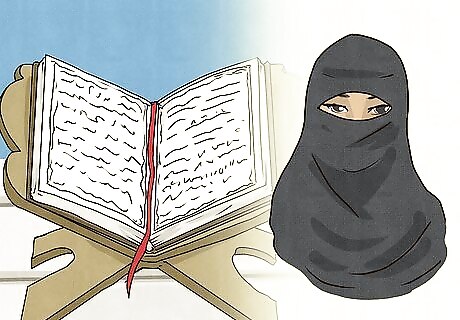
Familiarize yourself with references to the Muslim dress code in ahadith and the Qur’an. The Prophet Muhammad's words and actions are recorded in ahadith. In many of these narrations you will find both the instructions and reasons for covering the face. The Qur’an will also offer guidance on why you should wear the niqab. By knowing the reasons, you will be able to answer any questions people may have for you. There is a difference of opinion among scholars about whether the niqab is compulsory or recommended under Islamic law (Shariah). Most argue that it is a recommended act that brings reward, but isn't compulsory, whilst some argue that not wearing it is a violation of the Shariah.

Wear the niqab to assert your Muslim identity. The niqab signifies your devotion and obedience to Allah and displays your full embrace of an Islamic identity. It empowers you to assert your individuality by rejecting how mainstream fashion tells you to dress. It is widely agreed amongst scholars that wearing niqab is an act that attracts great rewards from Allah.
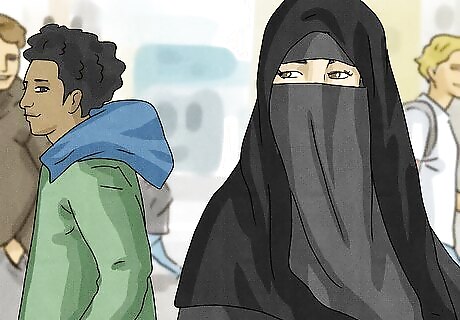
Let the niqab protect you. Allah has prescribed the niqab to help protect your modesty and honor. It therefore helps to remind you that Allah shields you and that He will protect you. When you wear the niqab, you know that you are obeying the will of Allah and guarding yourself against temptation. Wearing niqab is a good way to remain mindful of Allah throughout the day. In covid times many women started their niqab journey after wearing a face mask before moving to a simple half-niqab over their hijab hiding the lower part of the face, and then a full-niqab covering the eyebrows as well as gloves.
Dealing with Hardships
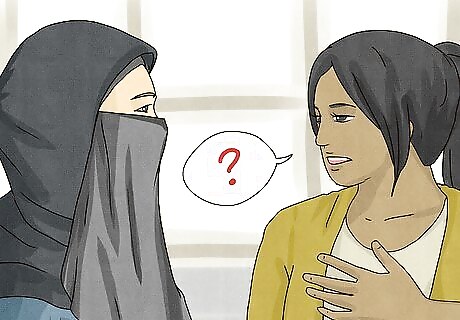
Be prepared to answer questions. Because some people may not fully understand why you completely cover your face, they will have questions about your motivations. Some might even believe that you’re being forced to wear the niqab. By thinking about your reasons to wear the niqab, you will be able to communicate your motivations clearly. Remind those that question you that by taking away physical distractions, you force them to engage with your personality, intellect and emotions directly.

Prepare answers to any questions that may arise. Many people will be curious about why you choose to wear the niqab and wonder what it means. Tell them that you are not being forced to wear the niqab, rather that you choose to honor Allah and display your devotion. Explain that you don’t have to wear the niqab all the time only when in front of unrelated men. Say that when you’re at home or with other girlfriends, you can dress how you want. Explain that wearing the niqab helps protect you from unwanted stares and attention. Although it's possible that your family or spouse may encourage you to wear niqab, it must ultimately be a decision between you and Allah to wear it.
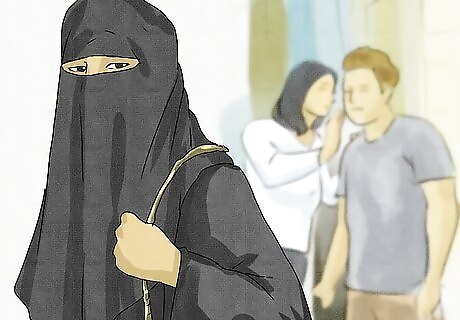
Understand that people are quick to judge. Regardless of what you wear as a woman, people will be prone to judge you. For instance, if a woman is wearing clothes that are too revealing, many people will call her derogatory names. Counter this by asserting your beliefs, personality, and opinions when people talk to you. You don't need to stop wearing the niqab just because people don't understand. Wearing niqab is between you and Allah, not them. If others have a problem with it and mock you, that is for them to account for on the Day of Judgement.

Take part in movements that seek to educate people on the niqab. Many groups exist on social media and on various online forums. These groups plan events that educate non-Muslims on why the niqab is important to them. Encourage Muslim sisters to wear a niqab for a day to experience the benefits for themselves. If you have daughters, encourage your daughters to wear a niqab by the time they reach puberty.

Participate in community events. Show the community that many of your ideals and values are aligned. For instance, if you wish to promote better education in the community or other initiatives, take part in the processes, like voting or meetings that help show that you are just as interested in the welfare of the place you live as they are.
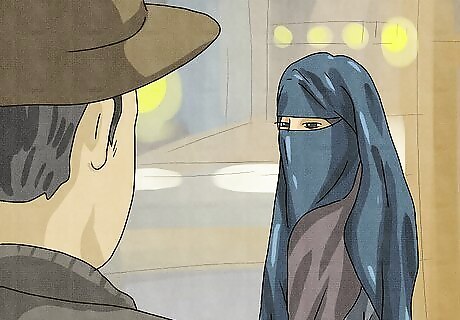
Prepare yourself to face hostility. Many people associate the niqab with extremists. You may also face accusations of political militancy. In order to dispel these prejudices, show your kindness and willingness to engage people in conversation. By doing so, you will help to change their minds and open them to Islam. Always try to display modesty and good Islamic character in your interactions with both non-Muslims and Muslims.

Be aware that people might stare at you. Most people in non-Muslim countries are not used to interacting with someone in niqab. They also do not understand the reasons why women choose to cover themselves. The most common reaction when people do not understand something is to become fearful, judgmental, and contemptuous. Have no fear when people stare. Instead be grateful for the protection that niqab provides.
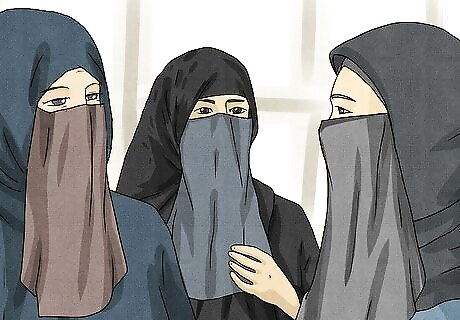
Find a support group. Find those in your community who also choose to wear the niqab. This will help motivate you when you encounter hostility. The support group will also encourage you when you feel disheartened.
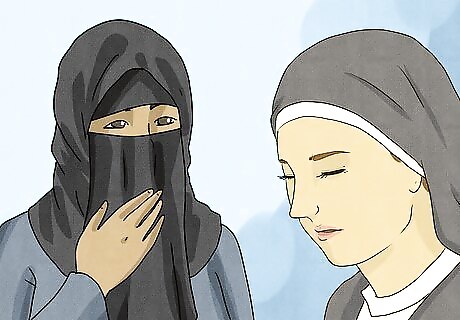
Understand your values and the values of those around you. As people approach you to try to understand why you wear the niqab, try to learn the culture and norms of the country you live in. This does not mean you have to assimilate their culture. Rather, this provides empathy for both parties. You will be able to relate your beliefs easier by phrasing your reasons and motivations in terms they can understand. For example, a comparison you might use would be the habits nuns wear in Catholicism. Nuns wear the habit as a symbol of poverty and devotion. Recently, many nuns have decided not to wear the habit, but some do so in order to communicate their beliefs. Explain the similarity that you wear your niqab much as the nuns wear habits and just like in Catholicism there are many Muslims who choose not to wear the niqab.

Be prepared to remove the niqab for security reasons. Many situations require you to uncover your face based on laws and regulations. For instance, if you are passing through airport security, they will ask you to remove the niqab to confirm your identity. Another situation where you may have to uncover is at the doctor’s office.
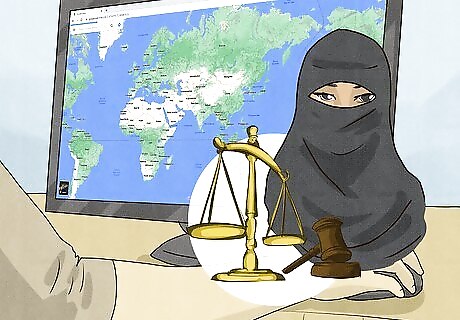
Know the laws of the non-Muslim country. Depending on where you travel, there may be laws that prohibit wearing the niqab. In countries such as France and Italy, wearing the niqab is illegal. Other countries have various laws regarding when women can wear a niqab such as when they are presenting evidence in court or teaching at a school.

Understand that certain activities will be harder. If you enjoy doing outdoor activities, then wearing the niqab will be harder. Eating at a restaurant will be more difficult. By understanding the physical restraints of the niqab, you can prepare and plan ways around these difficulties. Many sports, including the sunnah sports of archery and horse riding, can be enjoyed whilst wearing the niqab.
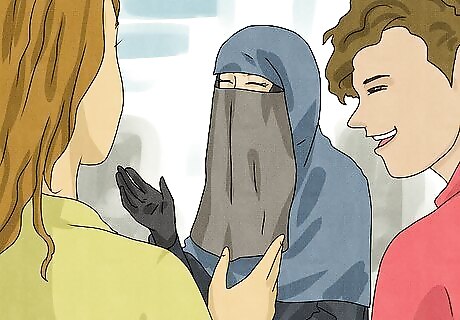
Be sociable. While you are wearing the niqab, you are representing Islam. When people act suspicious or hostile, respond to with kindness. Smile as hard as you can under the niqab so that your eyes reflect your happiness and warmth.


















Comments
0 comment